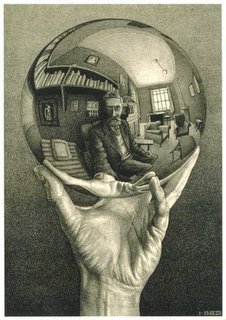What can open source do next decade?


(Anyone who didn't go through an M.C. Escher period during college needs to go back. This is his famous crystal ball.)
One by one the niches fell. And while proprietary vendors could still innovate around and beyond open source, most found it necessary to make peace or die. Sometimes make peace and die.
So what might open source do in the teens? (At least we have a name for this new decade. We never settled on a name for the old one.)
I know what many in the business will say. Open source will be assimilated. Everything will be mixed source. Products will be a melange of licenses -- enough to make you feel it's open, but not enough that you can avoid paying the guy at the bottom of the stack.
This seems a reasonable attitude because so much open source is moving into places where business models are established and reasonable. Hardware, the cloud.
- You buy hardware at a store, it moves through the channel, and it doesn't matter whether the software inside is open or closed. Is there really a difference between a Google Nexus One and an iPhone, from the transaction point of view?
- You buy services by the month or the user or the hour or the project. What's really the difference between a fee for cloud services and a software license for an anti-viral? One is monthly, the other annual. Is that all the revolution was for?
But in fact much has changed, and we won't go back. Commodity software has a shelf life now. You can no longer demand renewed payments for the same old same old. Someone is going to deliver an open source competitor and take your market.
Then there is the problem of Windows. This is not open source's problem. Some might argue that the Internet, from which open source is born, caused the problem, by letting hackers deliver attacks from anywhere, just as the Internet lets anyone build and deliver open source software.
Some will argue that solving the problems of Windows and security will mean closing off the Internet somehow, that it will require user licenses, audit trails of every online session, an end to anonymity.
I may be wrong, but I don't buy this. I think it's software, not the Internet, that has to change. I think either Microsoft solves the problem or open source will solve it and eliminate the need for Microsoft. This tension will be one of the decade's biggest stories.
What will be some of the others?